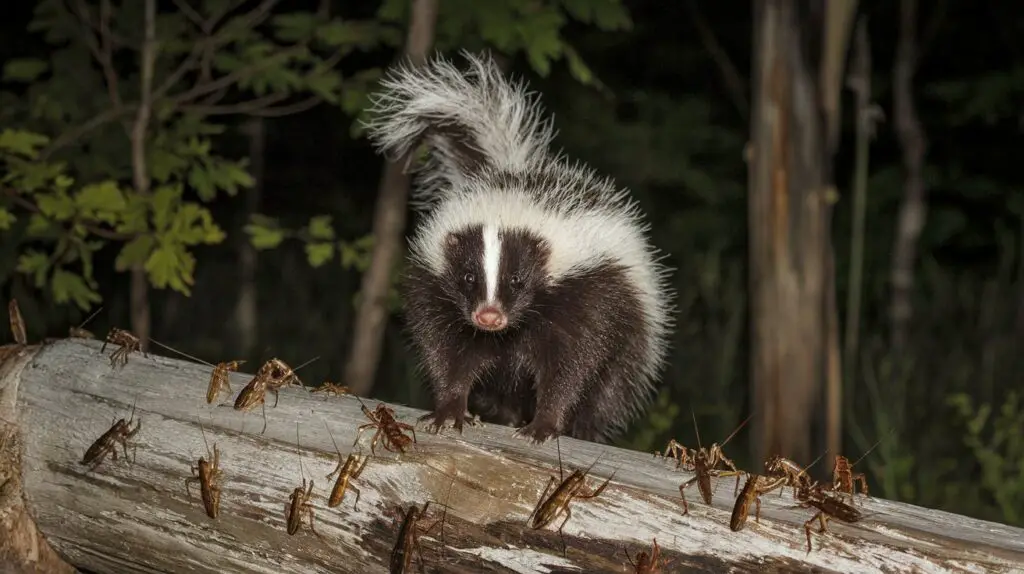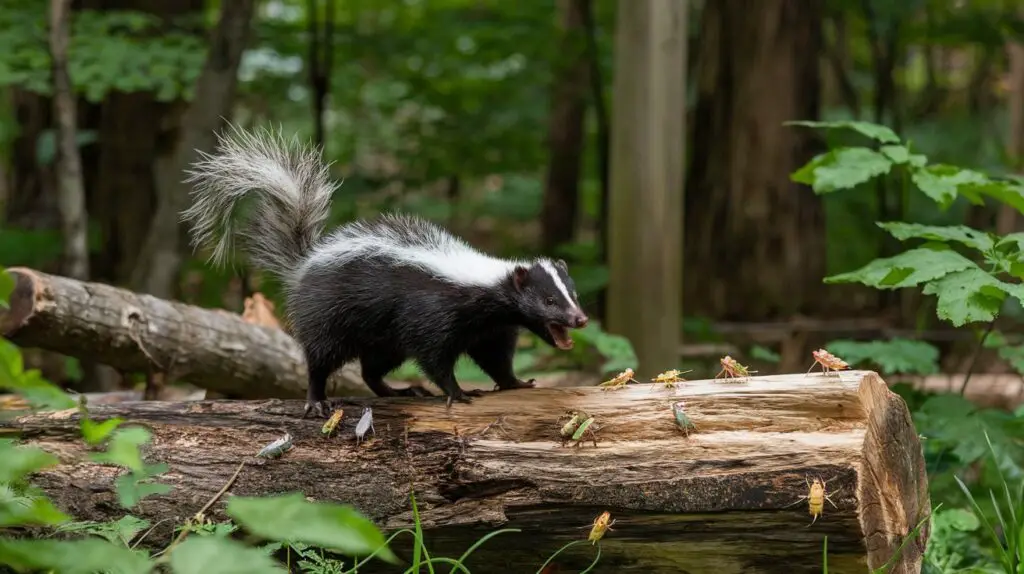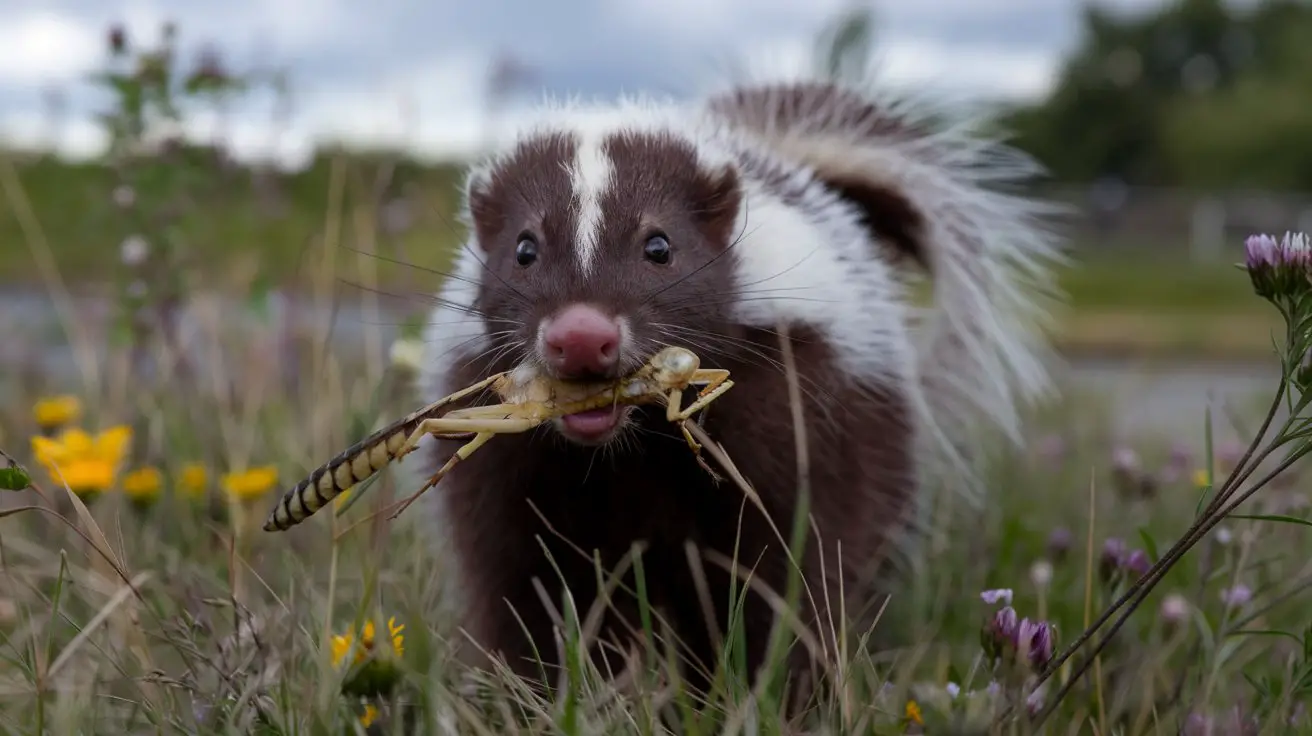Do Skunks Eat Crickets
Skunks do eat crickets. Skunks are omnivorous animals that eat a wide range of things, including insects, mice, birds, fruits, and vegetables.
Despite their notorious smell, they can be cute and charming creatures. These black-and-white mammals have a unique ability to spray a strong-smelling liquid when they feel threatened. But skunks are beneficial for the environment because they eat insects and other small animals that can be harmful to crops and gardens.
We will explore more about skunks, their diet, and their behavior patterns.
Diet Of Skunks
Skunks are known for their unique and varied diet, which includes insects, small rodents, fruits, and vegetables. While skunks do eat crickets, they are not a central part of their diet and are usually consumed as a snack option.
Skunks are known for their potent odor and unique striped pattern, but their diet may surprise you. These carnivorous creatures have a diverse palate and consume both plant and animal matter.
Are Skunks Omnivorous?

Yes, skunks are considered omnivorous animals. They have adapted to survive in various environments by consuming whatever is available. Their diet may vary based on the season, location, and availability of food.
What Do Skunks Eat?
Skunks eat a variety of things, including:
- Insects
- Small mammals
- Birds and eggs
- Fruits and vegetables
- Seeds and nuts
- Garbage and human leftovers
They’ll hunt mice, voles, shrews, rabbits, and even reptiles. They’ll eat berries, nuts, acorns, and other plant matter. Skunks may also scavenge garbage cans and compost piles for food.
Do Skunks Eat Insects?
Skunks are known to eat insects such as crickets, grasshoppers, beetles, and larvae. They’re often seen digging up turf in search of grubs and other soil-dwelling insects. Skunks may also prey on beehives, eating both the insects and honey.
Skunks have an important role to play in the ecosystem, as they control pests and help to disperse seeds. However, it’s important to keep a safe distance from skunks, as they can spray their potent scent if they feel threatened. If you encounter a skunk in the wild, give it plenty of space and allow it to pass by.
Crickets As Food
Skunks are omnivores and will eat a variety of foods, including insects like crickets. While crickets are not necessarily a staple in their diet, skunks may consume them if they are available and easily accessible.
Crickets may seem insignificant but they have been a popular food source for various animals including skunks. These small insects are rich in nutrients which make them an excellent food option for animals. In fact, crickets are sometimes referred to as “micro-livestock” because of their high nutritional value. In the wild, skunks are omnivores and will eat a variety of foods including insects, fruits, vegetables, and small animals. In this section, we will dive deeper into the nutritional value of crickets and whether or not it is common for skunks to eat crickets.
Nutritional Value Of Crickets
Crickets are a great source of protein, vitamins, and minerals. They contain all nine essential amino acids that are necessary for proper growth and development. Crickets are also high in calcium and iron which are essential for bone health and oxygen transport in the body. Additionally, they are a good source of dietary fiber. Overall, crickets are a nutrient-rich food that can benefit many animals including skunks.
Is It Common For Skunks To Eat Crickets?
Skunks are known to eat a variety of insects including crickets. However, it is not their primary food source as they also consume fruits, vegetables, and small animals. Skunks may eat crickets if they come across them while foraging for food. In captivity, crickets can be a great addition to a skunk’s diet as they provide essential nutrients. It is important to note that crickets should not make up the majority of a skunk’s diet and should be fed in moderation.
In conclusion, crickets are a nutritious food source for animals, including skunks, due to their high protein, vitamin, and mineral content. While skunks do consume crickets as part of their diet, they are not their primary food source. It is important to provide skunks with a balanced diet that includes a variety of foods to ensure they receive all the necessary nutrients for a healthy life.
Research On Skunks And Crickets

Researchers have found that skunks do eat crickets as part of their diet. Skunks are omnivores and consume a variety of insects, small rodents, and fruits. However, crickets are not a primary source of food for skunks.
Skunks are known for their distinct odor, but they are also fascinating creatures with interesting eating habits. One question many people have is whether skunks eat crickets. There have been several studies and observations on skunks and their diet, including their consumption of crickets.
Studies On Skunks’ Diet
Research on skunks’ diet has shown that they are omnivores, meaning they consume both plant and animal matter. Skunks have a varied diet that includes insects, fruits, vegetables, and even small mammals. While they are primarily insectivores, their diet can vary depending on the availability of food in their environment.
Observations On Skunks And Crickets
Although skunks are known to eat insects, there haven’t been many studies specifically on their consumption of crickets. However, there have been observations of skunks eating crickets in the wild and captivity. Skunks can be seen rooting through the grass and soil to find insects such as crickets to eat.
Skunks are efficient hunters and will eat whatever they can find in their environment. While they may prefer certain food sources, they are adaptable and able to survive on a varied diet. Crickets are just one of the many insects that skunks may encounter and consume in their quest for food.
In conclusion, while there haven’t been extensive studies on skunks and their consumption of crickets, there have been enough observations to suggest that skunks do eat crickets. Skunks have a diverse diet and will eat whatever they can find in their environment to survive. So, it is entirely possible for skunks to consume crickets as part of their diet.
Behavioral Patterns Of Skunks
Skunks are omnivores and eat a variety of food including insects, plants, and small animals. While crickets are not their preferred food, skunks may consume them if they have no other options available. However, skunks are known for their strong sense of smell and will hunt for food based on scent rather than sight.
Skunks are characterized by their unique black and white fur and their distinct unpleasant odor. They are nocturnal creatures that are omnivorous, meaning that they eat both plant and animal matter. Skunks are also known to be solitary animals that prefer to keep to themselves. In addition to their distinctive appearance and scent, skunks have interesting behavioral patterns, especially when it comes to their feeding habits.
Feeding Habits Of Skunks
Skunks are opportunistic feeders that will eat almost anything they find. They have a diverse diet that includes insects, small mammals, and even plant matter such as berries and nuts. Skunks are known to be diggers and will use their strong claws to dig up the ground in search of food. They can also climb trees to reach their food, making them versatile hunters. In addition to their hunting skills, skunks have a unique feeding habit that involves making a choice about what to eat based on its level of freshness and quality.
Seasonal Changes In Skunks’ Diet
Skunks’ diet will vary depending on the season and availability of food. During the spring and summer months, they tend to favor insect-based diets, including crickets. When the weather cools, they will switch to a more mammal-based diet, including small rodents. In the fall, they will forage more heavily for nuts and berries in preparation for winter. Skunks generally have a preference for fresh food, which is why they will often choose food that is readily available and freshly caught.
In conclusion, skunks are fascinating creatures with unique feeding habits that have adapted to survive in different environments. While they may be considered pests by some, they play an important role in controlling pest populations and keeping ecosystems in balance.
Frequently Asked Questions For Do Skunks Eat Crickets
What Insects Do Skunks Eat?
Skunks are omnivores and feed on insects, small mammals, plants, and garbage. They eat various insects, including beetles, grasshoppers, crickets, and caterpillars after hunting them at night. They are known to eat harmful pests and are considered beneficial to gardeners and farmers.
What Do Skunks Eat At Night?
Skunks primarily feed on a variety of insects, including beetles, crickets, and grasshoppers, at night. They also eat fruits, vegetables, bird eggs, small mammals, and fish. Occasionally, skunks may scavenge for food from human trash cans.
What Do Skunks Like To Eat The Most?
Skunks mainly eat insects, grubs, small rodents, and fruits. They also eat garbage, pet food, and other human food items. Their diet varies with their habitat, availability of food, and climate. Skunks are omnivores and eat a variety of food.
Conclusion
Skunks are opportunistic eaters that can eat a variety of food, including insects. They particularly enjoy crickets, especially during the warm months when these little creatures are abundant. While they may not eat crickets every day, it’s safe to say that skunks don’t shy away from them.
As with any wild animal, it’s best to keep your distance and not feed them. Understanding what they eat can help you coexist peacefully with skunks and appreciate their place in the ecosystem.

